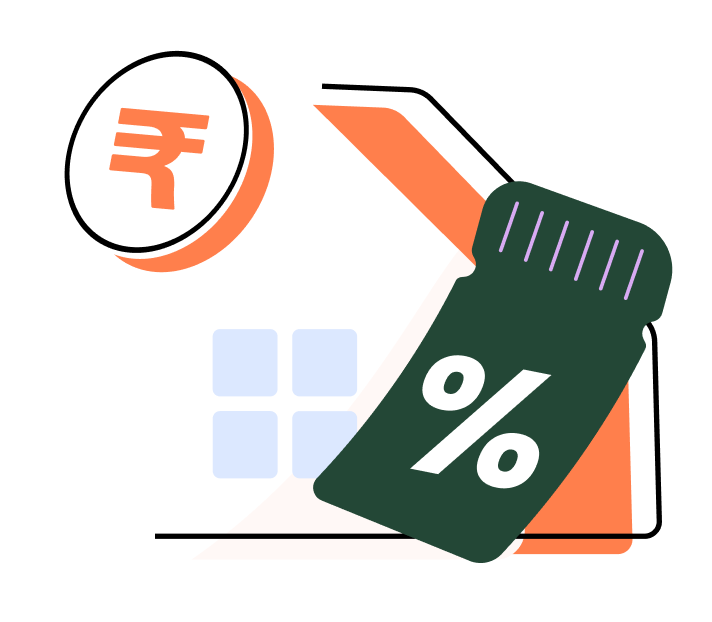Home loan and mortgage loan are both secured loans which are usually required either to buy or construct properties.
So what exactly is the difference between home loans and mortgage loans? This article will talk all about it.
We understand that secured loans are a type of loan where the lender accepts collateral against the borrowed amount so that if a borrower fails to repay the loan, then the lender can retrieve the loan amount with the help of the collateral. But just because both home loans and mortgage loans are secured loans, they are not the same.
Now, before understanding the difference between a home loan and a mortgage loan, it is important you know what each of these loans are and how they function.

While both these loans seem similar at first glance, here are some of the main differences between home loans and mortgage loans.
|
Home Loan |
Mortgage Loan |
|---|---|
|
A home loan is primarily used for either purchasing a house or constructing a house. There is a restriction on how the amount should be used. |
The loan amount received as a mortgage loan can be used to meet both personal as well as business requirements such as debt consolidation, education, marriage, or even to construct a property |
|
There is tax exemption under section 80C of the Indian Income Tax Act, 1965 |
No tax exemption is applicable |
|
Lower interest rate compared to mortgage loans |
Interest rates are higher than home loan interest rates |
|
Low processing fee compared to mortgage loan |
Higher processing fee compared to home loan |
|
Can be availed for longer tenures of up to 30 years |
Maximum tenure is up to 20 years, however this can vary from one lender to another |
|
Loan offered is up to 90% of the property's market value |
Loan offered up to 60% to 70% of the property's market value |
A home loan is a loan that is availed from a bank or NBFC to either buy/ construct a house or renovate an existing property.
The loan tenure is usually for a long period of time and ranges from 15 years to 30 years and the interest rate usually starts at around 7% per month.
There is a provision for choosing either floating or fixed rate of interest on the principal amount. In a fixed rate home loan, the interest amount on the principal amount remains the same throughout the entire tenure.
But, in a floating or variable rate home loan, the rate of interest fluctuates based on the market condition over the repayment duration.
A mortgage loan is also a type of secured loan where an applicant borrows a particular amount of money by mortgaging property.
In this case, the property against which the loan amount is approved is the collateral.
Mortgage loans are also known as loans against property because loans are provided against a property which could be either a residential property or commercial or other immovable properties like land, gold, heavy machinery, shop, etc.
In a loan against property, the lender remains as the actual owner, until the borrower pays off the loan completely.
A reverse mortgage is a type of loan where the homeowner borrows against the value of his/her home and receives a lump sum amount either as fixed credit or line of credit.
Here the homeowner does not have to make any loan payments. A reverse mortgage is ideal for senior citizens who have a self-acquired or self-occupied home in India. They can avail this loan to support themselves, if they don’t have adequate income to support themselves.
The lender will make payments to the borrower against the mortgage of his / her residential house.
On the other hand, a home equity loan is a type of consumer debt that allows a homeowner to borrow against the equity in his/her residence.
The approved loan amount is determined based on the difference between a home's current market value and mortgage balance due. Here the equity in the home serves as collateral for the banking institution and comes with a set repayment schedule.
Thus, the major difference between a reverse mortgage and home equity loan is that in the former, you don’t have to make repayment. But, in the case of a home equity loan, you need to repay the loan amount to the bank.
Your Dream Home is Now a Click Away
Buying a property is a dream for many and even if they are unable to raise the funds required on their own, they can always avail a home loan for the same. While both home loans and mortgage loans are secured loans, there are differences such as the purpose for which each of these loans are used, the interest rate, etc.
Choose what works for you based on your requirements and income. However, if you wish to avail a smaller loan amount instantly without having to provide collateral, Moneyview personal loans are the best option for you.
Home Loan Types & Eligibility Guide
Home Loan Insights and Guides
Moneyview UPI Insights and Guides
Personal Loan by Income and Purpose
Disclaimer
The starting interest rate depends on factors such as credit history, financial obligations, specific lender's criteria and Terms and conditions. Moneyview is a digital lending platform; all loans are evaluated and disbursed by our lending partners, who are registered as Non-Banking Financial Companies or Banks with the Reserve Bank of India.
This article is for informational purposes only and does not constitute financial or legal advice. Always consult with your financial advisor for specific guidance.
Was this information useful?